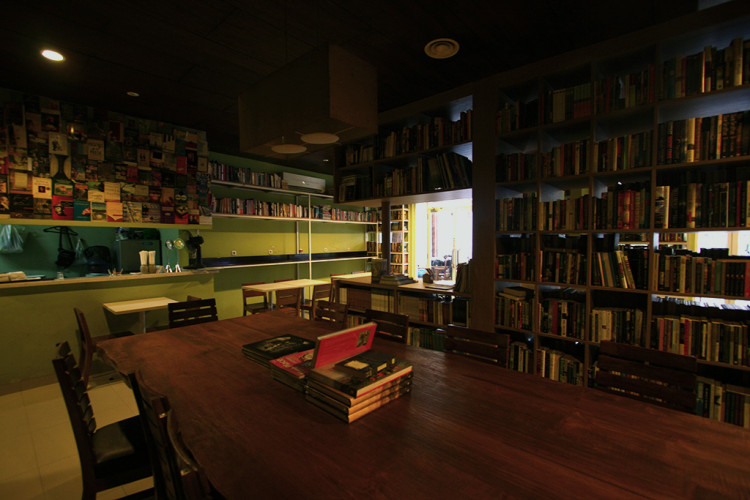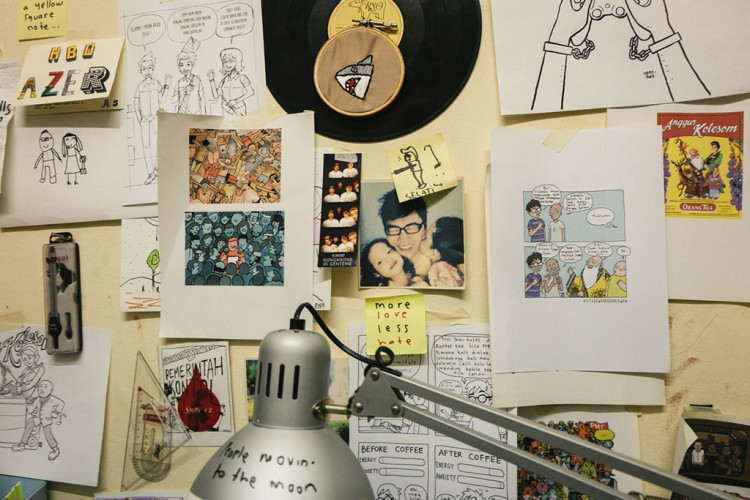





























Medayu Agung Library
Discovering the Lost History of the Country
When was the last time you visited a library to read, or maybe to borrow books, purely for pleasure? In the era of information glut, the importance of places like libraries is often overlooked. With the existence of internet, social media, and digital papers, libraries have become neglected places despite the fact that they play an essential role in society. Neil Gaiman, a British author, on his lecture for the Reading Agency shares an important perspective regarding this matter:
“Books are the way that we communicate with the dead. The way that we learn lessons from those who are no longer with us, that humanity has built on itself, progressed, made knowledge incremental rather than something that has to be relearned, over and over. There are tales that are older than most countries, tales that have long outlasted the cultures and the buildings in which they were first told. If you do not value libraries then you do not value information or culture or wisdom. You are silencing the voices of the past and you are damaging the future.”
As a country with quite a dark past, it is important for Indonesia to preserve its libraries. Looking back at Indonesia’s bygone times, there are some mishaps in our history, including the 1965 incident and the 1998 riot. To be able to construct a better outlook for the nation, it is important for us to perpetuate libraries because it is a place that contains the history and vision of the past. One of the important libraries found in Indonesia is the Medayu Agung Library. Located in Medokan Ayu, Rungkut, a southern area of Surabaya, the library was opened in the year 2001 by an ex-journalist named Oei Hiem Hwie. It is basically a personal library that is open for public.
Mr. Oei Hiem Hwie’s life is as interesting as the books he collects. Born in the year 1935, Oei showed his passion for the world of writing when he enlisted to a journalism course after finishing high school. After graduating, he started working for “Trompet Masjarakat”, a local newspaper in Surabaya. Unfortunately, not long after he started to working for the newspaper, on Friday, 1st October 1965, the Thirtieth of September Movement hit the country with the assassination of six Indonesian Army generals, an incident that later triggered the anti-communist purge in the country. This lead to a massive assassination and detention of people suspected to have relations with the Indonesian communist party (PKI). Considered to be the part of the communist party, “Trompet Masjarakat” was closed and Oei arrested. “They saw us as Soekarno-ist, which was the main reason my office got banned and why they detained me”, Mr. Oei explains.
Fortunately, Oei’s detainment didn’t quell his spirit. Instead, he saw it as an opportunity to learn. Eventually, on his transfer from one prison to another, he met the famous author, Pramoedya Ananta Toer, who was also detained on Buru Island in the 70’s. There, he assisted Pram in his writing and the two formed a friendship. Mr. Oei used to call him “Mr. Lecturer”. When Oei was released in 1978, he smuggled some of the Pram’s writing out of jail to make sure that they won’t be destroyed by the Suharto regime’s harsh censorship.
Pramoedya Ananta Toer’s original manuscripts can be seen in Medayu Agung Library, one of them displayed in a glass enclosure in the corner of the library, next to Pram’s handwritten notes on paper cement packaging. He also keeps some of Pram’s unpublished original manuscripts on a shelf dedicated to the seminal writer. “I wish that more people could read Pram’s unpublished writings, but the right to publish these manuscripts is in the hands of his children. Well, at least the visitors of this library can read it here, or if they really want it, I can lend them the copy”, Mr. Oei said.
On November 24th this year, Mr. Oei will celebrate his 80th birthday, and at this age we still can see the light in his eyes shine when he shares the story of the library’s collection. In the “rare collection” room, he has many scarce old books and history books that includes Soekarno’s art collection catalogues (with original photos of the artworks), Adam Malik’s ceramic book collection, Raffles’ “History of Java”, to the original and the Dutch translated versions of Mein Kampf. He received some of these books from his grandfather and others directly from the writers.
Besides antiques and historical books, the other areas of the library are filled with pieces from vintage newspapers. Perhaps a reflection of Oei’s past job as well as his passion for journalism, there is a huge collection of newspapers in Medayu Agung – more noticeable on the second floor, where he archived his newspaper collections. Housing old and new issues, Mr. Oei collects local, Chinese and Javanese newspapers from around the country. Even now he compiles and clips newspapers and magazines to add to his collection – a hobby that earned him an award by MURI (Record Museum of Indonesia) for the most dedicated newspaper collector in the country in 2004. Nonetheless, among those piles of newspapers, he kept very special pieces of it in his personal cabinet. Placed in the front room, the special collection is the last prints of the newspaper he worked at, Trompet Masjarakat. “We have to be careful when opening this, because the only reason we are still be able to read it now is because my family managed to hide them in the ceilings of our house. And we finally were able to open it again after the end of the Suharto era. Just imagine the condition of paper that were stored in the ceilings for more than 30 years”, Mr. Oei said.
His Chinese background is also reflected in the library’s collection. He keeps a lot of Chinese antique literature on the library’s boxes and shelves. From old Chinese book stories, Chinese philosophy writing, to heartbreaking books that capture the 1998 anti-Chinese riot. “Apparently, the ’98 riots drew attention from the international public because I found these books when I travelled abroad. Most of them are from Hongkong, but there also a book from Holland. I still haven’t seen such copy from our own country, just to put out a proper explanation for the incident. That’s quite strange, isn’t it?”, Mr. Oei asks. This is a reason why our people need to preserve or at least to go more to a library – to learn about the past and build a better future for the country.
Perpustakaan Medayu Agung,
Jl. Medayu Selatan IV/42-44, Surabaya,
Jawa Timur, Indonesia, 60295











